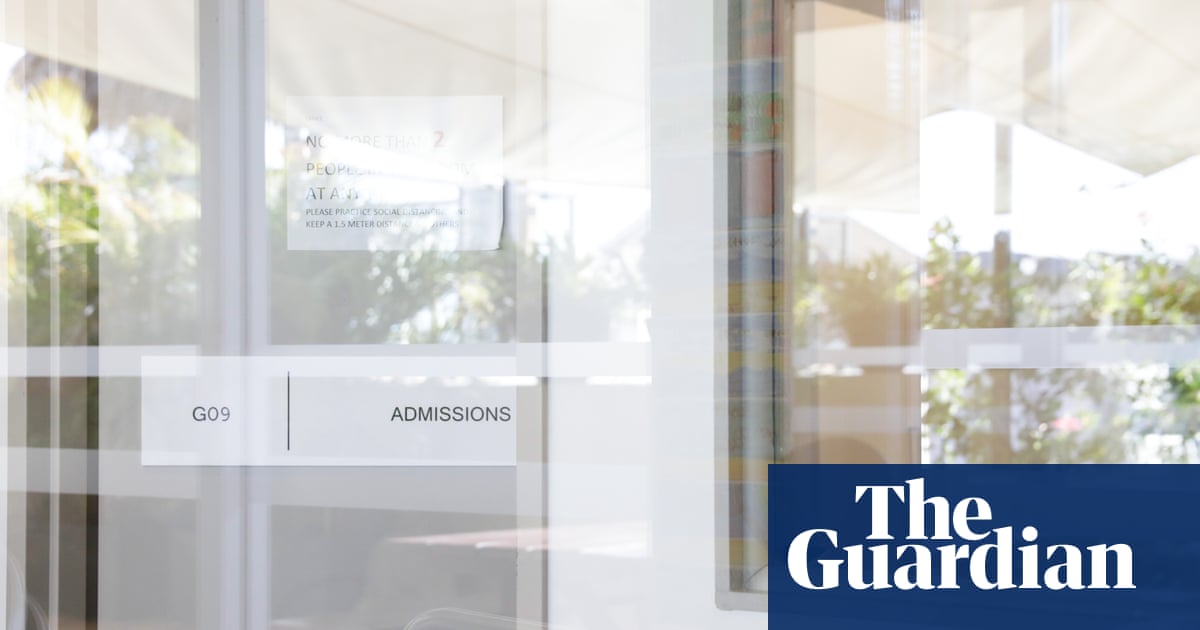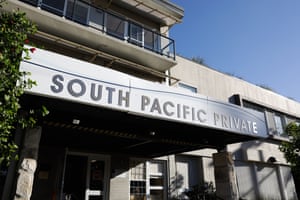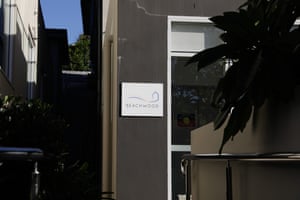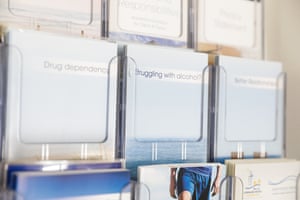‘A lot of people have relapsed’: isolation has been a mixed blessing for drug addicts


For three weeks, Jack* lived in a bubble. He was oblivious to the ban on gatherings, the state of emergency declarations, the run on toilet paper. His phone was confiscated, and the television news never switched on.
Jack was in the middle of his own crisis. He had checked into the South Pacific Private treatment centre in Sydney because his life was “spiralling out of control”. He was just 20, and for two years had been addicted to illicit drugs, especially crystal methamphetamine, known as ice.
His parents, John* and Marie*, had done everything they could to help him get off drugs, including moving from Melbourne to Lakes Entrance in Victoria’s East Gippsland six months before. “As an addict, you find it. And I found it the first night I moved down here. It just finally clicked for me that I just couldn’t live like this any more.”
John says that for two years, every decision the family made revolved around how to help Jack get off drugs. “We’ve been through hell,” he says.

In early March, Jack was an inpatient at South Pacific in Curl Curl, a Sydney beachside suburb. Each day was structured: up at 6.30am to walk along the beach, breakfast at 7.30am, group therapy for two and a half hours, intense sessions about trauma, anxiety and depression; “what caused you to use, essentially”. There were lessons about basic life skills, setting boundaries, the process of change.
Jack was cut off from the outside world. He had just one visitor during his time at South Pacific. There were occasional 10-minute phone calls and no news. The idea was that Jack and other patients focused on their recovery with no distractions.
When Jack emerged, he went straight to Beachwood Recovery House next door, where he planned to stay for 10 weeks. A person with serious drug misuse problems can be weaned off the physical addiction fairly quickly, but often needs weeks of gradual transition to normal life. Controls were loosened slowly. Phones were returned, Sundays were free time, and the television set was on.

“I walked straight in and on the news was this big headline saying coronavirus, the borders are gonna shut. I was like, ‘oh my God’.” Physical distancing measures had already been introduced at Beachwood, reducing numbers in therapy sessions. He spent a week there until its day programs shut down due to coronavirus fears and he was asked to leave.
“I was really upset because I didn’t really want to come back to Lakes Entrance because this is where a lot of my shit happened,” says Jack. The closure was abrupt. Jack’s mother, Marie, drove nearly eight hours from Lakes Entrance to Sydney and picked him up on 23 March.
“She was crying, for starters, because I hadn’t seen her in a month,” he says. “She said she just wanted to bring me home in isolation while this virus dies over. But she noticed a massive change in me – in the way I spoke and acted – so she was really happy.”
The pandemic hasn’t caused people’s existing challenges to disappear. It has just added another layer of complexity for people with drug and alcohol problems. Jack is fortunate. The demand for treatment in Australia far exceeds supply, a commission investigating the rise of ice addition in New South Wales found this year. His parents’ health insurance covered most of the $21,000 cost of rehab, although they had borrowed money to pay for the transition program.
Isolation can also exacerbate stress and anxiety. A YouGov Galaxy survey commissioned by the Foundation for Alcohol Research and Education found that 70% of Australians were drinking more alcohol now than usual.
So far, Jack is doing well at home. He’s a tall, gentle-faced young man, his charm and self-deprecating humour masking two years of chaos. “I’m 75 days clean and sober,” he says.

Coronavirus has meant his Narcotics Anonymous meetings are now online, a trend experts say is likely to continue post lockdown. He’s a social creature, and he misses going to Melbourne to visit his friends. He’s filling his time bushwalking, mountain bike riding, “trying to stay sane … and annoying the shit out of my parents, who are amazing”.
When all this is over, he’d like to go back to Sydney to complete the transition program. The South Pacific rehab centre remains open, with a 48-hour quarantine for new patients, and sessions held in large rooms to enable social distancing.
Isolating in the pretty holiday town of Lakes Entrance might help Jack and it might not. He has deleted the contacts of former friends who were users from his phone, and the temptations of late-night clubbing are gone. But boredom can be a trigger for people with addiction and Jack has struggled with cravings.
“A lot of people I was with in South Pacific have relapsed,” he says. “This isolation, a lot of people can’t really find other things to keep them distracted so they’re turning back to drugs. It’s an addict’s life essentially.”
He has enrolled in a certificate course in drug and alcohol counselling. Perhaps some good could come from this.
“I’ve got a story that could really help a lot of young people who [are] in my position,” he says. “Out of all my friends I’m the one the best at giving advice, so I thought I’d extend on that a bit. I want to be able to change young people’s lives before they get too far gone.”
*Not their real names.
Postcards from the pandemic looks at how everyday Australians are coping with immense changes coronavirus has brought to their lives. We’d like to hear your story about how you are managing during this crisis. Email: postcards@theguardian.com
 Pathways Drug Rehabilitation Luxury Addiction Treatment & Detox Center
Pathways Drug Rehabilitation Luxury Addiction Treatment & Detox Center


